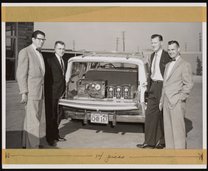Oral history interview with Max D. Liston
- 2002-Feb-19
- 2003-Jan-22
Max D. Liston begins the interview with a discussion of his education. After graduating from high school in Fort Scott, Kansas, Liston attended the University of Minnesota. In 1940, he received a B.A. in electrical engineering with an option in communications. He was hired at the Chrysler Corporation that same year; and he participated in the Chrysler Institute, receiving his M.S. in mechanical engineering in 1941. After transferring to General Motors in 1942, Liston developed the breaker-type DC amplifier while modifying a submarine analyzer developed by Charles Kettering. With the assistance of Morris Reeder, Liston also developed an innovative vacuum thermocouple. In 1946, he was hired at PerkinElmer as the chief engineer. While there, he incorporated the breaker amplifier and vacuum thermocouple in to his designs for the Model 12 and Model 21 spectrophotometers. In 1950, Morris Folb and he formed the Liston-Folb company, which later became Liston-Becker. Together, they developed three atmospheric-analyzer models for the US Navy's submarines, and the Model 16 capnograph. Beckman Instruments acquired Liston-Becker in 1955. When Beckman Instruments consolidated their assets three years later, the Connecticut-based Liston-Becker plant was closed and Liston moved to California to become the corporate director of engineering. One of his most significant projects at Beckman Instruments was the development of automobile-emissions analyzers for smog tests in L. A. Liston is currently the president of Liston Scientific, a company he formed in 1975. His numerous accomplishments since its founding include the development of the Paramax, Digital-Alpha technology, and chemical-luminescence instrumentation. Liston concludes the interview with a brief discussion of his perceived influence on the field of spectrophotometry.
Access this interview
By request 1 PDF Transcript File and 11 Audio Recording Files
Fill out a brief form to receive immediate access to these files.
If you have any questions about transcripts, recordings, or usage permissions, contact the Center for Oral History at oralhistory@sciencehistory.org.









